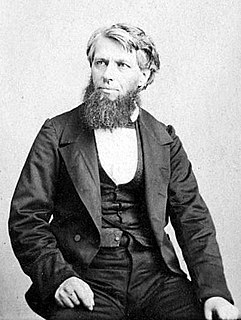A Quote by Washington Irving
In civilized life, where the happiness, and indeed almost the existence, of man depends so much upon the opinion of his fellow-men, he is constantly acting a studied part. The bold and peculiar traits of native character are refined away or softened down by the levelling influence of what is termed good-breeding, and he practises so many petty deceptions and affects so many generous sentiments for the purposes of popularity that it is difficult to distinguish his real from his artificial character.
Quote Topics
Related Quotes
He is not famous. It may be that he never will be. It may be that when his life at last comes to an end he will leave no more trace of his sojourn on earth than a stone thrown into a river leaves on the surface of the water. But it may be that the way of life that he has chosen for himself and the peculiar strength and sweetness of his character may have an ever-growing influence over his fellow men so that, long after his death perhaps, it may be realized that there lived in this age a very remarkable creature.
And I have yet to find one single individual who has attained conspicuous success in bringing down enemy aeroplanes who can be said to be spoiled either by his successes or by the generous congratulations of his comrades. If he were capable of being spoiled he would not have had the character to have won continuous victories, for the smallest amount of vanity is fatal in aeroplane fighting. Self-distrust rather is the quality to which many a pilot owes his protracted existence.
This leads us to note down in our psychological chart of the mass-man of today two fundamental traits: the free expansion of his vital desires, and, therefore, of his personality; and his radical ingratitude towards all that has made possible the ease of his existence. These traits together make up the well-known psychology of the spoilt child.
Man in his raw, natural state as he comes from the womb is morally and spiritually corrupt in disposition and character. Every part of his being-his mind, his will, his emotions, his affections, his conscience, his body-has been affected by sin (this is what is meant by the doctrine of total depravity)
Many are the lives of men unwritten, which have nevertheless as powerfully influenced civilization and progress as the more fortunate Great whose names are recorded in biography. Even the humblest person, who sets before his fellows an example of industry, sobriety, and upright honesty of purpose in life, has a present as well as a future influence upon the well-being of his country; for his life and character pass unconsciously into the lives of others, and propagate good example for all time to come.




































